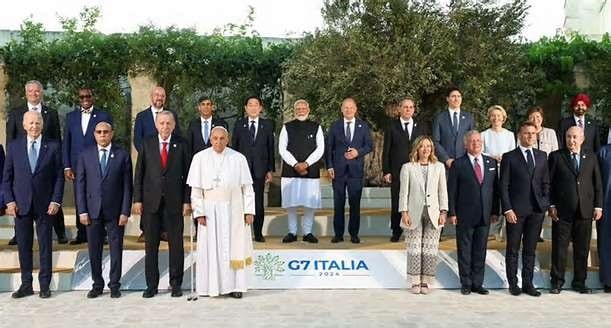The Group of Seven (G7) Summit held in Italy's Apulia on Friday has further solidified India's image as the leader of the Global South, right at the start of Prime Minister Narendra Modi's third consecutive term.
Having given resonance to the voice of the Global South over the last decade, especially during India's G20 presidency, PM Modi once again chose a major global platform to spotlight the concerns of developing countries during his first overseas trip after assuming office, earlier this week.
"The countries of the Global South are bearing the brunt of global uncertainties and tensions. India has considered it its responsibility to place the priorities and concerns of the countries of the Global South on the world stage," the Prime Minister said in his address at the Outreach Session of the G7 Summit.
With India having strongly established itself as an all-weather friend of Africa during his tenure, PM Modi also emphasised New Delhi's commitment to the continent.
"We have given high priority to Africa in these efforts. We are proud that the G-20, under India's chairmanship, made the African Union a permanent member. India has been contributing to the economic and social development, stability, and security of all African countries, and will continue to do so," he assured the world leaders gathered at the G7 event.
On Saturday, hours after his meeting with PM Modi at Borgo Egnazia, German Chancellor Olaf Scholz backed the Indian Prime Minister's efforts to further amplify the voices from the emerging countries and the Global South at international fora.
"The G7 is not an exclusive club. That is why here in Apulia we continued what we started in Elmau and spoke to many representatives of the Global South. This must continue to be the case in the future. Because we want a partnership from which everyone benefits," Scholz posted on X along with a photograph of him engaged in an animated discussion with PM Modi and Japanese Prime Minister Fumio Kishida during the G7 event on Friday.
Even as he pursues the goal of having a 'Viksit Bharat' by 2047, PM Modi has made it clear that India's efforts to drive South-South cooperation will receive fresh momentum during his third term.
The attendance of Bangladesh Prime Minister Sheikh Hasina, Sri Lankan President Ranil Wickremesinghe, Maldives President Mohamed Muizzu, Seychelles Vice-President Ahmed Afif, Mauritius Prime Minister Pravind Kumar Jugnauth, Nepal Prime Minister Pushpa Kamal Dahal 'Prachanda' and Bhutan PM Tshering Tobgay at the PM's swearing-in ceremony sent a strong message that India will always remain committed to the cause of the Global South and the developing countries.
"PM Modi called for deeper people-to-people ties and connectivity in the region. He further added that India would continue to amplify the voice of the Global South in the international arena," the Ministry of External Affairs said after the PM's interaction with the leaders at the Rashtrapati Bhawan.
In the past too, leaders of the developing countries across various continents instilled faith in PM Modi's leadership and counted on India as a reliable partner when it came to making their voices heard at the gatherings of world leaders amid the ongoing geopolitical tensions.
Last year, when he travelled to Port Moresby to host the third summit of the Forum for India–Pacific Islands Cooperation (FIPIC III Summit) jointly with his counterpart from Papua New Guinea, James Marape, leaders of the small island countries called themselves as "victims of global powerplay" and called on PM Modi to further elevate the issues of concern to the region.
"You are the voice that can offer our issues at the highest level as advanced economies discuss matters relating to economy, commerce, trade, and geopolitics. We want you to be an advocate for us as you sit in those meetings and continue to fight for the rights of small emerging nations and emerging economies," Marape said in his address.
Several countries in Africa and the Caribbean also consider India and Prime Minister Modi as their flag bearer on the global stage.
During her visit to New Delhi last October, Tanzanian President Samia Suluhu hailed India as a powerhouse, an extended family member separated by a coastline, a friend for all seasons, and a leader of the Global South.
"Beyond familyhood and trade partnership, India is our strategic ally. India is now a powerhouse. It possesses the needed soft and hard powers enough to shape outcomes, influence change, and raise a voice to be heard in the lobbying corridors, and rooms where world decisions are made, and our fate as developing countries is decided," she said while receiving her first foreign honourary doctorate from the Jawaharlal Nehru University (JNU).
Similarly, the 15-member Caribbean Community (CARICOM) has time and again highlighted the significance of maintaining a "close and vibrant working relationship" with India -- a country they believe is playing a major role in having their voices heard at major global platforms.
India's position as a voice of the Global South is expected to further consolidate during Modi 3.0 using the Prime Minister's 5S approach of 'Samman, Samvad, Sahyog, Shanti, and Samriddhi', as was listed in the 'Sankalp Patra' released by the BJP for the just-concluded Lok Sabha elections.
"A distinct global image has been built in the last 10 years as India has emerged as a Vishwa Bandhu. Its maximum advantage will begin now. I am fully confident that the next five years will be extremely useful for the country as far as the global environment is concerned," the Prime Minister asserted in his first comments after staking a claim to form the government for the third consecutive time, last week.




Fall of Congress in Gujarat: Three decades of decline and struggle for relevance
The Congress party was once the dominant political force in Gujarat, shaping the state’s governance since independence. However, over the past 30 years, the party has witnessed a dramatic downfall, losing ground to the BJP’s aggressive electoral strategies, organisational strength, and ideological appeal.
‘Disempowering Muslims’: J&K political parties oppose Waqf (Amendment) Bill
All political parties of J&K, except the BJP, opposed the Waqf (Amendment) Bill, saying that the Bill is intended to disempower Muslims and only target one religion.
Radical group founder wanted in Jaipur serial blast plot apprehended in Ratlam
The Madhya Pradesh Police in Ratlam achieved a significant breakthrough in apprehending Firoz, also known as Sabji, a fugitive implicated in a conspiracy to execute serial blasts aimed at creating panic and terrorising the Rajasthan capital city of Jaipur.
Amit Shah & Akhilesh Yadav’s lighter exchange in LS over party president
Amid the uproar and heated debate between the ruling party and the Opposition over the Waqf Amendment Bill on Wednesday, the Lok Sabha witnessed some lighter moments between Home Minister Amit Shah and SP President Akhilesh Yadav.
Waqf Bill weakens Constitution, defames minorities, divides society: Gaurav Gogoi
As Parliament debated the contentious Waqf Amendment Bill, 2025, on Wednesday, deputy leader of Opposition in the Lok Sabha Gaurav Gogoi came down heavily on the government.
Bill not linked to religion, it’s prospective and not retrospective: Kiren Rijiju flays naysayers
Union Minister for Minority Affairs Kiren Rijiju on Wednesday tore into the Opposition for ‘spreading falsehood’ over the Waqf Amendment Bill and urged the ‘doubters and naysayers’ to refrain from misleading the people on the proposed reforms.
Parliament was being claimed as Waqf property: Rijiju slams UPA for making provisions 'overriding' other laws
Parliamentary Affairs Minister Kiren Rijiju on Wednesday bashed the previous UPA government for de-notifying 123 properties and handing them over to the Delhi Waqf Board.
Bhopal’s Muslims burst firecrackers in support of Waqf (Amendment) Bill
A large number of Muslims in Madhya Pradesh's capital, Bhopal, burst firecrackers on Wednesday to express their support for the Waqf (Amendment) Bill, which was presented in the Lok Sabha earlier in the day.